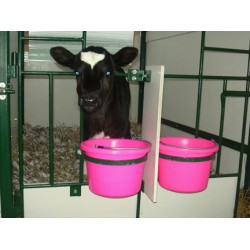Probiotics, which can help in the fight against infection in the newborn animal, have been introduced to some early-life and youngstock products in the G Shepherd Animal Health range.
Ready for this season’s lambing, the company’s First Thirst Lamb Colostrum Supplement has now been enriched with probiotics, reflecting the benefits of seeding the new-born lamb’s digestive tract with favourable bacteria, which have been demonstrated to improve health and performance.
This is said to be a particularly useful tool in the fight against watery mouth, which can cause significant losses, usually in the first three days of life.
Vet, Graham Shepherd, the company’s chief executive, says: “Sheep farmers are aware of the importance of colostrum in the lamb’s first hours, but the ewe’s own colostrum can need supplementation in some situations.
“This may occur after a difficult lambing, for multiple births or when the ewe is not in the best of health – perhaps with mastitis or twin lamb disease.”
Lambs in these situations are far more likely to be affected by watery mouth, which occurs when E coli bacteria rapidly multiply and colonise the small intestine, and release toxins.
“The disease is almost always fatal, so it is important to prevent its occurrence rather than try to achieve a cure,” he says.
Adding proven probiotics to its first feeds can help the lamb establish a more favourable gut microflora which has the potential to overcome bacterial infection.
“The probiotic we use has been extensively trialled across several livestock species in research undertaken around the world,” says Dr Shepherd. “It contains high populations of the lactic acid bacterium, Enterococcus faecium, which naturally inhabits animal intestines.
“This bacterium has the ability to out-compete many unfavourable bacteria, including some which cause scours,” he says. “It can dominate the gut flora, reduce pH, improve digestion through better enzymic activity, and provide an environment which is generally unfavourable to many undesirable, pathogenic micro-organisms.”
However, Dr Shepherd is at pains to point out that the damaging effects of infection are best avoided by general good practice – most importantly, the early intake of plentiful amounts of the ewe’s own colostrum – and hygiene to reduce the concentration of infectious agents at around the time of lambing.
He also adds: “If bottle feeding or tubing the lamb, good hygiene is of the utmost importance to avoid introducing infection at this vulnerable stage.”
Pro-BOOST supplement
The same favourable bacterium, Enterococcus faecium, is also present in Pro-BOOST which has recently been added to the G Shepherd Animal Health range.
Using this supplement continues to build a favourable gut microflora, so equipping the young animal to fight infection throughout its first weeks of life.
“Pro-BOOST can be mixed with milk replacer or the ewe’s own colostrum or milk, whenever it’s felt the lamb needs a top up, and is particularly useful in ongoing milk replacer for pet lambs,” he says, remarking that the same product can also be fed to piglets and calves.
A further benefit of Pro-BOOST comes from the prebiotics the supplement also contains.
“Prebiotics provide a source of feed for the favourable bacteria, so enhancing their growth and establishment in the animal’s digestive tract,” he says.
Also pointing out that livestock farming is moving away from the treatment of disease, with a far greater emphasis placed on prevention, he explains: “Prevention no longer means the blanket use of antibiotics – which is now considered a practice of the past – but instead should turn towards equipping the animal to fight infection in a more natural way.”
Furthermore, he says the bonus of boosting health by seeding the gut microbiome extends beyond the digestive tract.
“The importance of the gut microbiome to animal health is increasingly understood, and its influence is now known to extend far beyond protecting against digestive infections,” he says. “Today, a favourable microbiota is known to have a positive influence on antibody levels and the immune response, providing important protection to the animal against a broad range of infectious agents.”
Notes for editors
Two photos are attached – Pro-BOOST and First-Thirst Lamb Colostrum Supplement.
G Shepherd Animal Health is an independent provider of products and advice for the health and welfare of calves, cattle and sheep.
For further information, please contact: 01772 690131, 07778 191964 or visit www.gshepherdanimalhealth.co.uk




